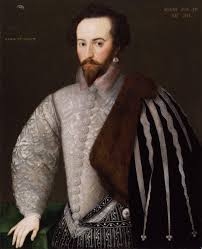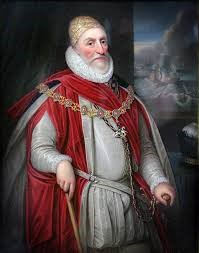Essex Rebellion
Chapter 3 : War with Cecil
Essex himself had fought valiantly and won praise from his men but the Queen showed her displeasure by refusing to advance the Earl in the various offices he requested. She did not relent until 1593 when Essex was at last appointed to the Privy Council.
Meanwhile, his political rivalry with Cecil was growing. On the death of Sir Francis Walsingham (Essex’ father-in-law and Elizabeth’s Principal Secretary) Cecil inherited most of the work, but not the official title. Cecil and his father, together with senior Privy Councillors, such as Sir Christopher Hatton and Lord Bulstrode, urged Elizabeth to grant him the post.
Essex was violently opposed to the appointment – instead promoting William Davison. Since Davison had been thrust into the outer darkness by Elizabeth for delivering the death warrant of Mary, Queen of Scots, one can only wonder why Essex chose to support such an unlikely candidate. At some point, Essex extracted a promise from the Queen not to give the post to Cecil and was furious when she changed her mind and finally confirmed him in it in 1596.
During 1596, Essex achieved the most spectacular victory of his military career when he was the commander in charge of the army at the sacking of Cadiz – a joint naval and army manoeuvre that aimed to destroy the Spanish fleet, and raze Cadiz, an important port, to the ground. The mission was partially successful – Cadiz was sacked and burnt and the leading townsmen were taken back to England for ransom - although the Spanish were pleasantly surprised to find that the English did not otherwise attack or rape the citizens.
King Philip’s treasure fleet, disappointingly for the Queen, was not captured and although Essex’ victory was preached far and wide (mainly by him), Elizabeth felt that the expedition had had a huge cost in money and men, that the kingdom could ill-afford. Additionally, she believed, far too much of such loot as there had been had found its way into the pockets of the army – both soldiers and commanders. She ordered the Privy Council to set up a Commission, with Cecil as a member, to investigate what had happened, much to Essex’ chagrin, although the outcome was that the Commission absolved him of any wrong-doing
Later in 1596, Cecil and Essex were again rivals as both built up networks of spies across Europe to try to keep ahead of Spanish plans for further invasions.Nevertheless, at the beginning of 1597, they had to work together to prepare the fleet for the government’s agreed strategy of destroying the new Spanish fleet and then (but only then) attempting to intercept the Spanish treasure ships, en route from the Americas. Essex was once more in charge of the expedition.

The expedition was a failure, as Essex and Raleigh did not destroy the Spanish shipping, but pursued the treasure fleet, and then missed it. Elizabeth was furious that, by leaving the Spanish warships intact, England had been exposed to invasion.
During the campaign Essex quarrelled with both Raleigh and with Lord Howard, the Admiral. Back at court, the appointment of Cecil to be Chancellor of the Duchy of Lancaster was the final straw for him as he was convinced that Cecil had been plotting behind his back. He retired from court in a sulk.

Later that year, he returned, and again he and Cecil reached an accommodation. Cecil was sent to France by Elizabeth to try to broker an accord with Henri IV and the Netherlands in creating a peace with Spain. Before leaving he had a number of conversations with Essex and Essex promised that in Cecil’s absence
‘nothing should be done…disagreeable unto him.’
In 1598, the opportunity arose for England to join the peace treaty that had been negotiated separately between France and Spain, Cecil’s mission having been unsuccessful. Elizabeth, supported by Cecil, and his father, Lord Burghley, agreed that they would encourage the Netherlands to join in the treaty. If the Netherlands declined, England would not abandon them, but they would have to pay towards England’s costs in defending their territories.
Essex was completely opposed to the plan, believing that Spain had to be totally defeated, citing Spain’s intervention in support of Irish rebels as proof they could not be trusted. The disagreement between Essex and Cecil on policy rapidly descended into the personal.
In the event, the Dutch refused to come to terms with Spain, so Elizabeth had little option but to continue the war. However, the country could ill-afford war on two fronts, and a rebellion in Ireland (fomented and funded by Spain) was rapidly growing serious.
